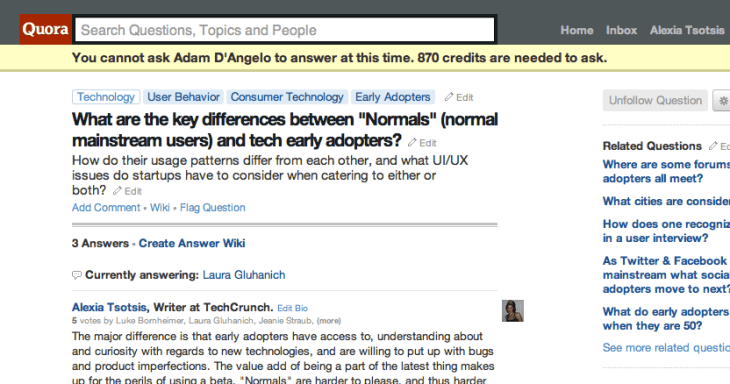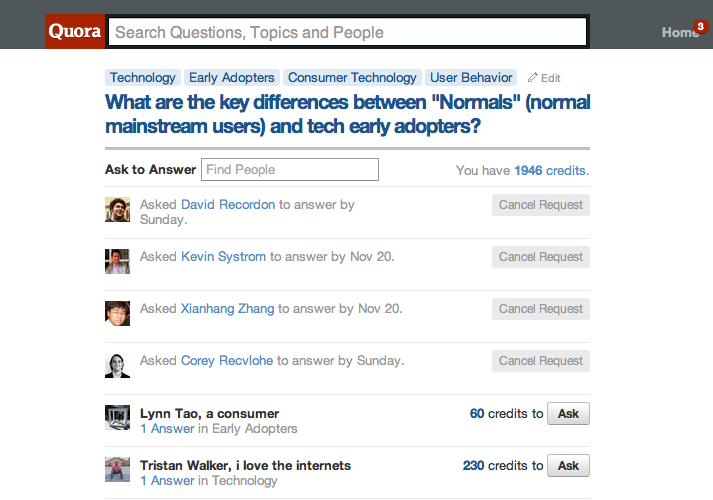After five months of beta testing, Quora has made its Quora Credits and “Ask to Answer” User Suggestions live for everyone today.
All users can now earn credits for a variety of positive and user engagement-magnifying Quora behaviors like answering questions they’ve been asked to answer, getting votes on answers to questions they’ve solicited through “Ask to Answer” and getting votes on their answers to other questions. Users can also give each other credits, which is awesome and can be managed through the Credit interface here.
This is all fine and good, but what exactly does Quora expect you to spend credits on? Especially since you can’t cash them in? Well Quora expects you to “pay” important people to answer your questions obviously.
For example, I can earn 45 Credits if I answer the question, “Which business model would be better for a “find a co-founder” website: Match.com or eHarmony?” An answer from Quora CEO Adam D’Angelo, who is an order of magnitude more important than me, to my “What are the key differences between “Normals” (normal mainstream users) and tech early adopters?” question costs a pricey 960 credits.
To reinforce this user hierarchy, Quora will now suggest topic experts after you ask questions — For example I was given a host of User Interface expert options like 37Signals Product Manager Ryan Singer after I tagged my question “UI.” Users can also now send reasons when they decline a question they’ve been asked to answer and use more credits to ask a question when they feel like upping the ante, two features that have been added since the beta.
So is Quora just trying to tack on gamification to see if it’ll stick? Well after using credits for a bit I can definitely say it’s sticky enough. My test question got 17 solid answers in a period of less than 24 hours, with the Credits and “Ask to Answer” elements definitely creating a positive feedback loop; It seemed like more people wanted to answer because they saw that “influencers” like Quora designer Rebekah Cox were answering.
Says resident Quora power user Semil Shah, “Personally, I love Quora credits. Not because I count them or try to accumulate a bunch…but mainly because when I have a question I’d like a range of opinions on, instead of just hoping someone answers or asking people directly, I can request an answer of a certain finite number of users (who have already written answers in those categories) from my experience, the response rate has been really amazing.”
And as we have written before, Quora is still working out the kinks on the whole value proposition thing (not to mention monetizing). I mean what’s more valuable, getting answers or answering? It’s not so cut and dry.
Credits is a thorough attempt to quantify the Quora value exchange, so users know (more) exactly where they stand. Sure it’s complicated, but it just might work, especially if it’s an intermediary step in some Mahalo-esque plan to eventually pay people — with actual money — for their efforts.
“We are going to monetize but this launch is focused on getting more good answers for people’s questions,” Quora co-founder Charlie Cheever tells me, “The results from our credits beta were really promising, so I expect so I expect this will do well and we’ll keep extending and evolving Quora Credits.”

